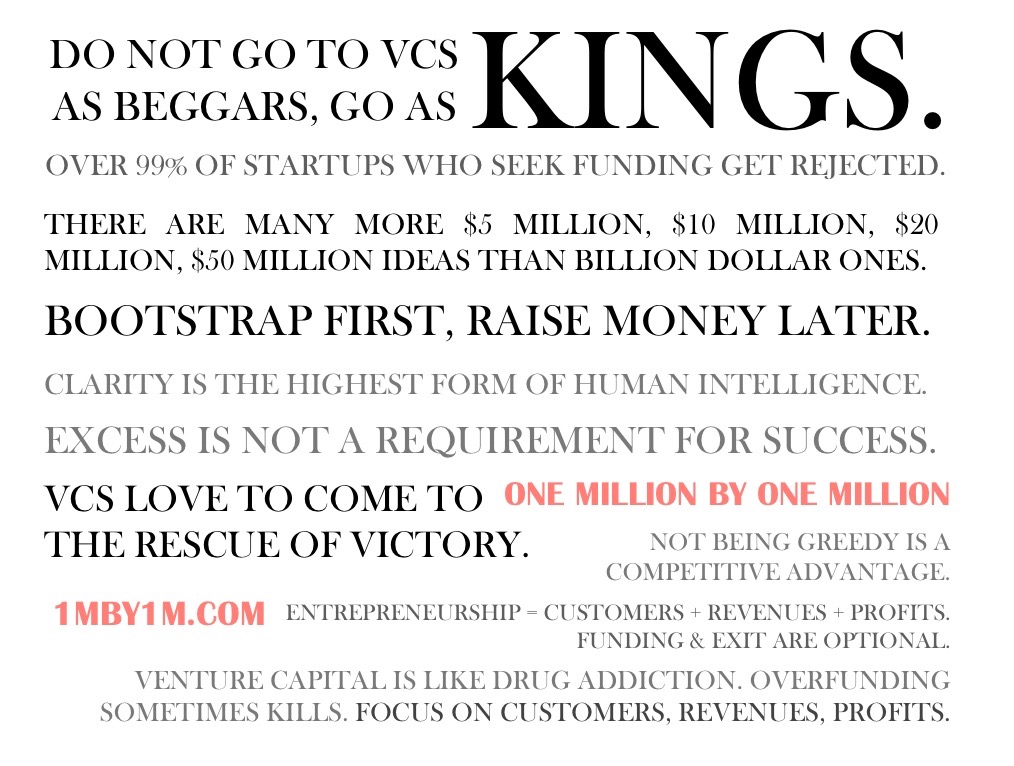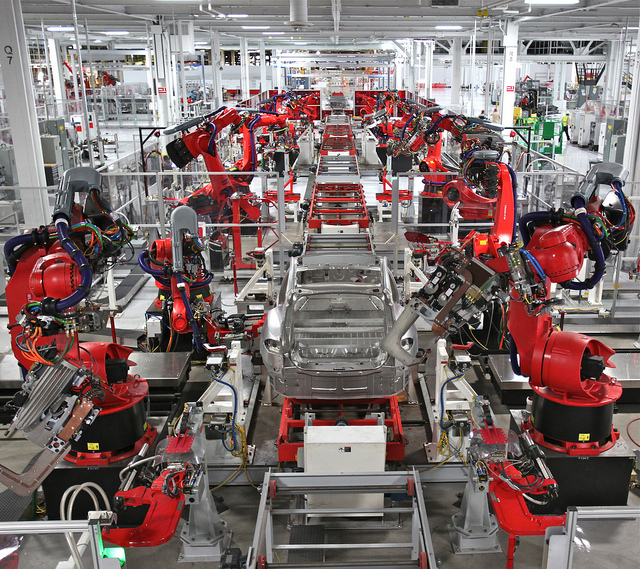Opinions
The Startup Velocity Question: What Hinders Acceleration in VC Funded Companies?

I have been running 1Mby1M since 2010. I find myself saying to entrepreneurs ad nauseam that VCs want to invest in startups that can go from zero to $100 million in revenue in 5 to 7 years.
Startups that do not have what it takes to achieve velocity should not be venture funded.
Experienced VCs, over time, have developed heuristics to gauge what constitutes a high growth venture investment thesis.
>>>How Did Mark Zuckerberg Preserve 26% Equity in Facebook?
Raising money too soon for a startup creates a number of serious problems.
You get diluted out of your ownership.
You destroy your cap table and follow-on funding becomes complicated to negotiate.
Watch this 2 minute 20 second video to learn how Mark Zuckerberg played the funding game and preserved 26% equity in Facebook.
Featured Videos
Can 1M/1M Help Me Raise Money?
How Does 1M/1M Democratize Entrepreneurship Education?
How Does 1M/1M Democratize Management Consulting?
When Is The Right Time To Join 1M/1M?
Can 1M/1M Help Me With Business Development?
Can 1M/1M Help Me With Market Sizing?
Can 1M/1M Help Me Validate My Product?
Will I Have Private 1-on-1 Sessions In 1M/1M?
How Does 1M/1M Help Entrepreneurs Connect With Silicon Valley?
Mentoring or Consulting?
Why Does 1M/1M Charge $1000 a Year?
Why Does 1M/1M Partner With Local Organizations?
Why Don\’t Mentoring Networks Work?
Why Is It Important To Study With 1M/1M Now?
Dan Stewart Story
Vikrant Mathur Story
How Do You Improve the Odds of Getting Your Startup Funded?
We’ve talked extensively about the alarmingly low probability of getting a startup funded in this video:
We’ve also said that you CAN dramatically increase your odds if you Bootstrap First, Raise Money Later.
Now, watch this 1 minute 41 sec video to learn more about how to improve the odds of getting your startup funded.
How to Increase the Odds of Getting into YCombinator
YCombinator rejects 97.15% of all applications.
Is there a strategy for raising your odds of getting into YCombinator?
The short answer is yes.
Watch this 2 minutes 11 second video on how Jas Grewal, CEO of CareSkore did it.
Death by Overfunding
Funding = Success, right? I wish it did. But entrepreneurial tracks are littered with carcasses of dead startups that were very well funded, some to the tune of hundreds of millions. As a case in point, watch this 2 minutes 31 second video: Death By Overfunding.
If you prefer to read instead of watching, read the Nasty Gal story here:
Death by Overfunding: Nasty Gal
>>>
The Future: White Collar Jobs Will Be Automated as Well
Right now, we’re still processing the 2016 US Presidential election, and focusing on blue-collar job losses that led to Trump’s victory.
But the truth is, within the next election cycle or two, we will see the pain being felt not only by blue-collar workers, but also white-collar folks.
Inequality: Technology & Automation: In the 30-50 year timeframe and beyond, technology and automation will create tremendous disruption. 60-80% of ALL jobs will, likely, get automated.
>>>
Probability of Raising Funding
I run One Million by One Million (1Mby1M) – a global virtual accelerator for startups. 2017 is our seventh year. And one particular trend keeps me awake at night. Thousands upon thousands of entrepreneurs have approached us for help with their funding at a stage where their chances of getting funding is ZERO. We can’t help them, regardless of how powerful our investor connections are. We can’t help a startup get funding before they become fundable. It pains me to see how many entrepreneurs have no idea what makes a startup fundable.
So, my humble advice to all entrepreneurs: please learn to assess your own probability of getting funded. Watching this 2 minutes 53 second video would be a very good start if you need a crash course in fundability.
Want introductions to Angels and VCs? A fundable and validated business is a must. >>>
The Future: India Will Take AI on the Chin
India’s development over the last two decades owes a lot to globalization and IT outsourcing from the West.
Today, the Indian IT-BPO industry employs 3.7 million people.
A large portion of this is relatively low skilled, or at least mid-range skilled positions.
Artificial Intelligence, it seems, will deliver on its promise on many vectors. Low-skilled tasks that can be automated WILL be automated. This will start showing impact relatively soon. Some analysts like HfS research have projected a job loss of 640,000 by 2021.
>>>
The Future: Focus on Micro Businesses for the Next 30 Years
I have written several pieces under The Future series title. Here’s a recap:
– The Future – Genetic Engineering?
– The Future – Destructive Technology Trends
– The Future – End Of Capitalism
– The Future – The Problem With Longevity
– The Future – Technology Without Philosophy
– The Future – The Most Important Entrepreneurial Challenge Of Our Time
– The Future – Age Of Idiocracy
Now, if you agree with my prognosis that both blue collar and white collar jobs are going to disappear at a massive scale due to automation, then you must ask yourself, what is a constructive direction forward?
I have two answers to this question. >>>
The Future: Genetic Engineering?
The world is becoming a hopeless, dangerous place for people who do not have high-end skills.
Anything and everything that can be automated, we can assume, in the next 30-50 years, will be automated.
That leaves vast numbers of people of out the workforce, unable to acquire high-end, non-automatable skills. They simply do not have the intellectual capacity for learning, for example, how to build robots. Or, how to do highly sophisticated research in particle physics.
So what would happen to these people?
>>>
The Future: Destructive Technology Trends
Creative destruction has been at the heart of Capitalism for a long time. Technology and innovation destroy existing world orders and create new ones.
The story is old.
The story is celebrated.
Recently, however, several technology trends are destroying without creating robust alternatives.
Media is a very good example.
>>>










